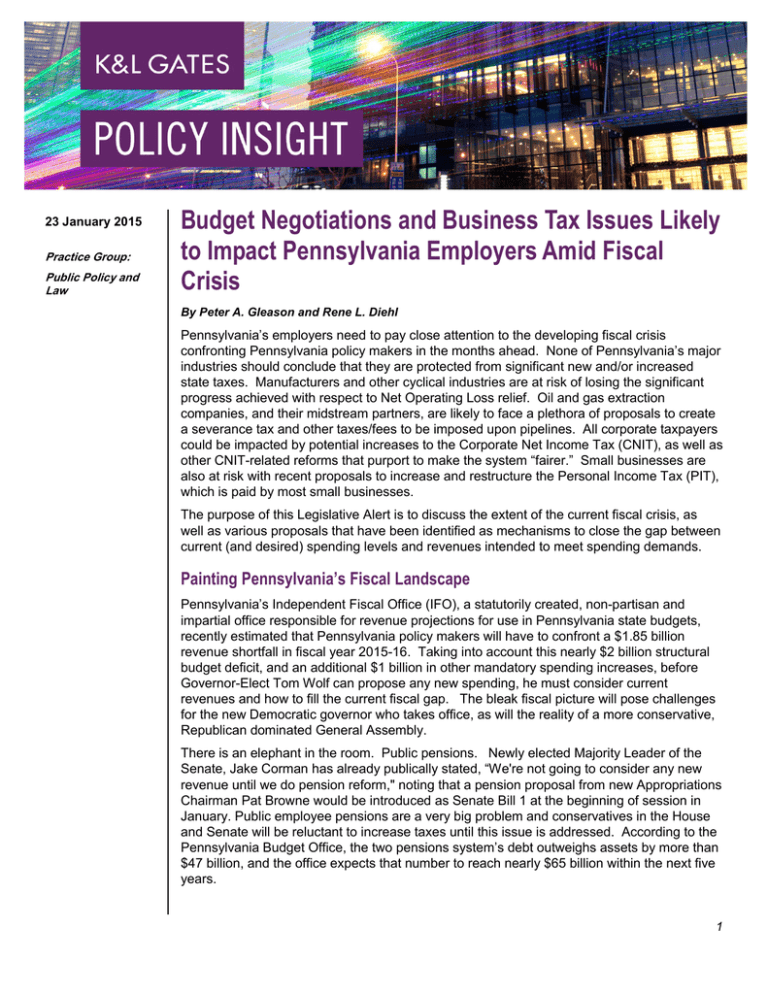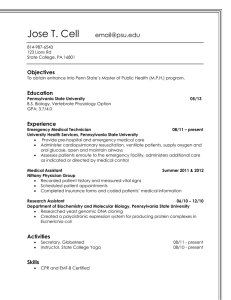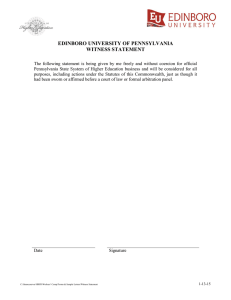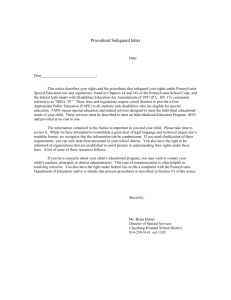
23 January 2015
Practice Group:
Public Policy and
Law
Budget Negotiations and Business Tax Issues Likely
to Impact Pennsylvania Employers Amid Fiscal
Crisis
By Peter A. Gleason and Rene L. Diehl
Pennsylvania’s employers need to pay close attention to the developing fiscal crisis
confronting Pennsylvania policy makers in the months ahead. None of Pennsylvania’s major
industries should conclude that they are protected from significant new and/or increased
state taxes. Manufacturers and other cyclical industries are at risk of losing the significant
progress achieved with respect to Net Operating Loss relief. Oil and gas extraction
companies, and their midstream partners, are likely to face a plethora of proposals to create
a severance tax and other taxes/fees to be imposed upon pipelines. All corporate taxpayers
could be impacted by potential increases to the Corporate Net Income Tax (CNIT), as well as
other CNIT-related reforms that purport to make the system “fairer.” Small businesses are
also at risk with recent proposals to increase and restructure the Personal Income Tax (PIT),
which is paid by most small businesses.
The purpose of this Legislative Alert is to discuss the extent of the current fiscal crisis, as
well as various proposals that have been identified as mechanisms to close the gap between
current (and desired) spending levels and revenues intended to meet spending demands.
Painting Pennsylvania’s Fiscal Landscape
Pennsylvania’s Independent Fiscal Office (IFO), a statutorily created, non-partisan and
impartial office responsible for revenue projections for use in Pennsylvania state budgets,
recently estimated that Pennsylvania policy makers will have to confront a $1.85 billion
revenue shortfall in fiscal year 2015-16. Taking into account this nearly $2 billion structural
budget deficit, and an additional $1 billion in other mandatory spending increases, before
Governor-Elect Tom Wolf can propose any new spending, he must consider current
revenues and how to fill the current fiscal gap. The bleak fiscal picture will pose challenges
for the new Democratic governor who takes office, as will the reality of a more conservative,
Republican dominated General Assembly.
There is an elephant in the room. Public pensions. Newly elected Majority Leader of the
Senate, Jake Corman has already publically stated, “We're not going to consider any new
revenue until we do pension reform," noting that a pension proposal from new Appropriations
Chairman Pat Browne would be introduced as Senate Bill 1 at the beginning of session in
January. Public employee pensions are a very big problem and conservatives in the House
and Senate will be reluctant to increase taxes until this issue is addressed. According to the
Pennsylvania Budget Office, the two pensions system’s debt outweighs assets by more than
$47 billion, and the office expects that number to reach nearly $65 billion within the next five
years.
1
Budget Negotiations and Business Tax Issues Likely to
Impact Pennsylvania Employers Amid Fiscal Crisis
Governor-Elect Wolf’s Campaign Promises
During the campaign, Governor-Elect Wolf proposed several tax policy changes. One of his
priorities is to “modernize the tax code.” To this end, he has vowed to increase Personal
Income Tax revenues by exempting lower income taxpayers and increasing the rate to
approximately 5 percent for higher income taxpayers, including and especially small
business. There is still a lot of mystery surrounding how exactly he would propose different
tax rates for different taxpayers, as well as questions about whether or not this type of
proposal would violate Pennsylvania’s Uniformity Clause. Regardless of the specifics of the
proposal, Pennsylvania small businesses need to be prepared to have a seat at the table to
ensure that policy makers understand the potential impacts on existing jobs from proposals
to “modernize” and or increase PIT rates.
Corporate taxpayers, particularly those with a multistate presence, also need to be prepared
to engage with policy makers and the Wolf Administration with respect to Governor-Elect
Wolf’s proposal to implement “mandatory combined reporting.” Depending on how it is
drafted, this tax proposal could pose a significant threat to current Pennsylvania businesses
and could act as a deterrent for any business looking to locate in the Commonwealth.
Discussions in the past regarding combined reporting have often times been in concert with
lowering the CNIT rate, but given the current fiscal crisis (i.e., $2 billion structural deficit, plus
at least another $1 billion in mandatory spending increases), combined with Governor-Elect
Wolf’s commitment to increase spending on Medicaid and Education, it is unlikely that
combined reporting would be used to decrease Pennsylvania’s already high CNIT rate. As
the new structure of the Administration unfolds, and as we take a look at those who have
been chosen so far to lead the new Governor’s transition team, it is hard not to notice
specific choices. For example, Sharon Ward, the Director of the left leaning and public
sector union funded Pennsylvania Budget and Policy Center (PBPC), has been chosen to
work on the Department of Revenue’s transition team. In the past, Ms. Ward has been
extremely vocal about the need to move to mandatory combined reporting, and was very
critical of the House Republican’s modest “add back” provision adopted in Act 52 of 2013.
With respect to oil and gas producers, and the many industries that support and/or benefit
from robust production within the Commonwealth, the PBPC has also taken the position that
the impact fee passed in 2012 on natural gas wells drilled into Pennsylvania’s Marcellus
Shale generates a “relatively small” amount of revenue from the gas industry. To date, the
impact fee has resulted in an estimated $600 million in revenues. Governor-Elect Wolf as
part of his platform intends to advocate for a new 5% severance tax and wants to invest the
revenues into education. This policy initiative could prove to be very destructive to the gas
industry and to the Pennsylvania economy as a whole.
The Threat Runs Deeper
Pennsylvania’s current fiscal situation jeopardizes favorable tax changes that have been
recently enacted.
• Net Operating Losses (NOLs). Pennsylvania has increased relief for NOLs from $2
million annually to 30 percent of income, which has been a significant victory for
Pennsylvania businesses. This success is in serious jeopardy this year and proponents especially manufacturers and other cyclical industries - need to be prepared to ward off
any attempts to go back and try to recoup revenues associated with this allowance.
2
Budget Negotiations and Business Tax Issues Likely to
Impact Pennsylvania Employers Amid Fiscal Crisis
• Phase out of the Corporate Stock and Franchise Tax (CSFT). Under current law, the
CSFT is slated to phase out by 2016. This phase out would result in a tremendous
savings for business. However there could be a willingness among lawmakers and
Governor Elect Wolf to halt the phase out which would mean a significant tax increase for
businesses in 2015-16.
• Vendor Discount. Currently businesses who remit Sales and Use Tax in a timely fashion
are afforded a vendor sales discount of 1%. Discussions revolving around capping and or
eliminating the vendor sales discount would again mean a tax increase for businesses
that rely on receiving this discount.
The Will of the Legislature
Typically, one might assume that the overwhelming Republican majorities in the House and
Senate, and the more conservative legislative leaders elected by an influx of fiscally
conservative Republicans, might provide a sufficient insurance policy against new or
increased taxes likely to be proposed by Governor-Elect Wolf during his budget address in
early-March. While it is fair to say that the increasingly conservative legislature is likely to be
hostile to an aggressive tax increase package, it would be a mistake to ignore the potential
for budget negotiations to produce any or all of the tax increases identified above as part of a
“global compromise” that addresses policy and fiscal priorities collectively, and which could
also rely upon a large number of Democratic votes.
Even some of the most conservative Republicans within both chambers of the General
Assembly have indicated support for a PIT increase and a “broadened” sales tax base; albeit
in an effort to use those revenues to reduce or eliminate property taxes. For instance, in the
2013-14 legislative session, Senate Bill 76, called “The Property Tax Independence Act.”
would attempt to raise the Personal Income Tax from 3.07% to 4.34%, increase the Sales
and Use Tax from 6% to 7% and, to make matters worse, would propose to eliminate the
following Sales and Use Tax (SUT) exemptions: food and beverages; clothing and shoes;
personal hygiene products; gum and candy; magazines; textbooks; and non-prescription
drugs. In addition, under SB 76, there would be a host of newly taxable services including:
legal services; architectural/engineering services; accounting services; and, advertising
services. These changes would result in an overall higher cost to conduct business in
Pennsylvania. The strong desire of conservatives within the General Assembly to increase
PIT and SUT revenues for property tax reform, paired with the fact that Governor-Elect Wolf
has previously demonstrated support for increasing Sales and Use Tax under the Governor
Rendell Administration, further underscore that the Pennsylvania business community must
be fully engaged within the political and legislative processes surrounding budget
negotiations over the next two years.
January will reveal a lot of outstanding missing pieces to the puzzle. The General Assembly
will reorganize and members will be placed into standing committee posts. Governor-Elect
Wolf will appoint his cabinet, as well as other Administration officials, and will immediately
begin on the work of crafting a proposed budget. One constant throughout the next six
months will be the discussion over revenues and the need to meet current budgetary
demands in order to pass a constitutionally mandated balanced budget. The newly elected
and now more conservative House and Senate leadership will be the ones holding the
Governor accountable as they wrangle with Pennsylvania’s budget deficit. It remains to be
seen if the Governor can bridge a political gap with the legislature to accomplish the task of
3
Budget Negotiations and Business Tax Issues Likely to
Impact Pennsylvania Employers Amid Fiscal Crisis
balancing this coming year’s budget, and it is inevitable both chambers as well as the
Governor will be seeking to find revenue raisers to meet their priorities.
Uncertainty breeds hesitancy when it comes to business planning. K&L Gates recognizes
the importance of predictability for its clients and is committed to having a voice and a seat at
the table as discussions unfold.
Authors:
Peter A. Gleason
peter.gleason@klgates.com
+1.717.231.2892
Rene L. Diehl
rene.diehl@klgates.com
+1.717.231.5982
Anchorage Austin Beijing Berlin Boston Brisbane Brussels Charleston Charlotte Chicago Dallas Doha Dubai Fort Worth Frankfurt
Harrisburg Hong Kong Houston London Los Angeles Melbourne Miami Milan Moscow Newark New York Orange County Palo Alto Paris
Perth Pittsburgh Portland Raleigh Research Triangle Park San Francisco São Paulo Seattle Seoul Shanghai Singapore Spokane
Sydney Taipei Tokyo Warsaw Washington, D.C. Wilmington
K&L Gates comprises more than 2,000 lawyers globally who practice in fully integrated offices located on five
continents. The firm represents leading multinational corporations, growth and middle-market companies, capital
markets participants and entrepreneurs in every major industry group as well as public sector entities, educational
institutions, philanthropic organizations and individuals. For more information about K&L Gates or its locations,
practices and registrations, visit www.klgates.com.
This publication is for informational purposes and does not contain or convey legal advice. The information herein should not be used or relied upon in
regard to any particular facts or circumstances without first consulting a lawyer.
© 2015 K&L Gates LLP. All Rights Reserved.
4




